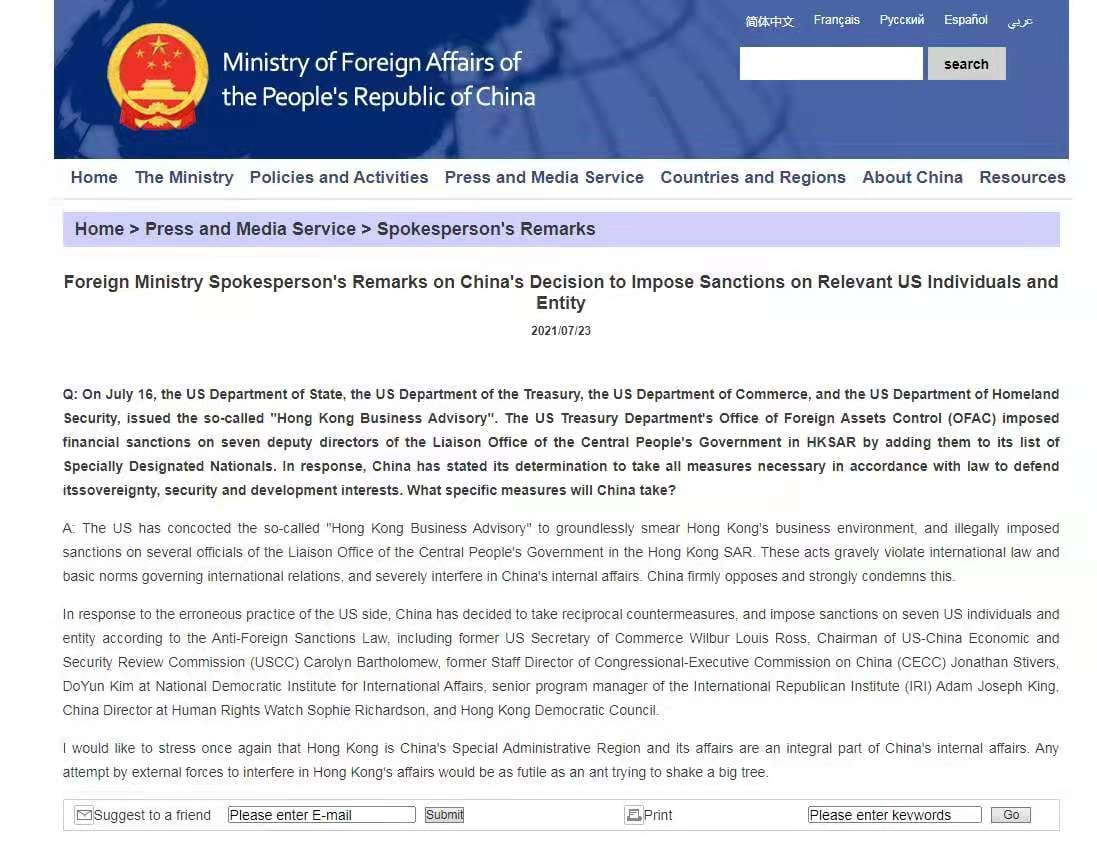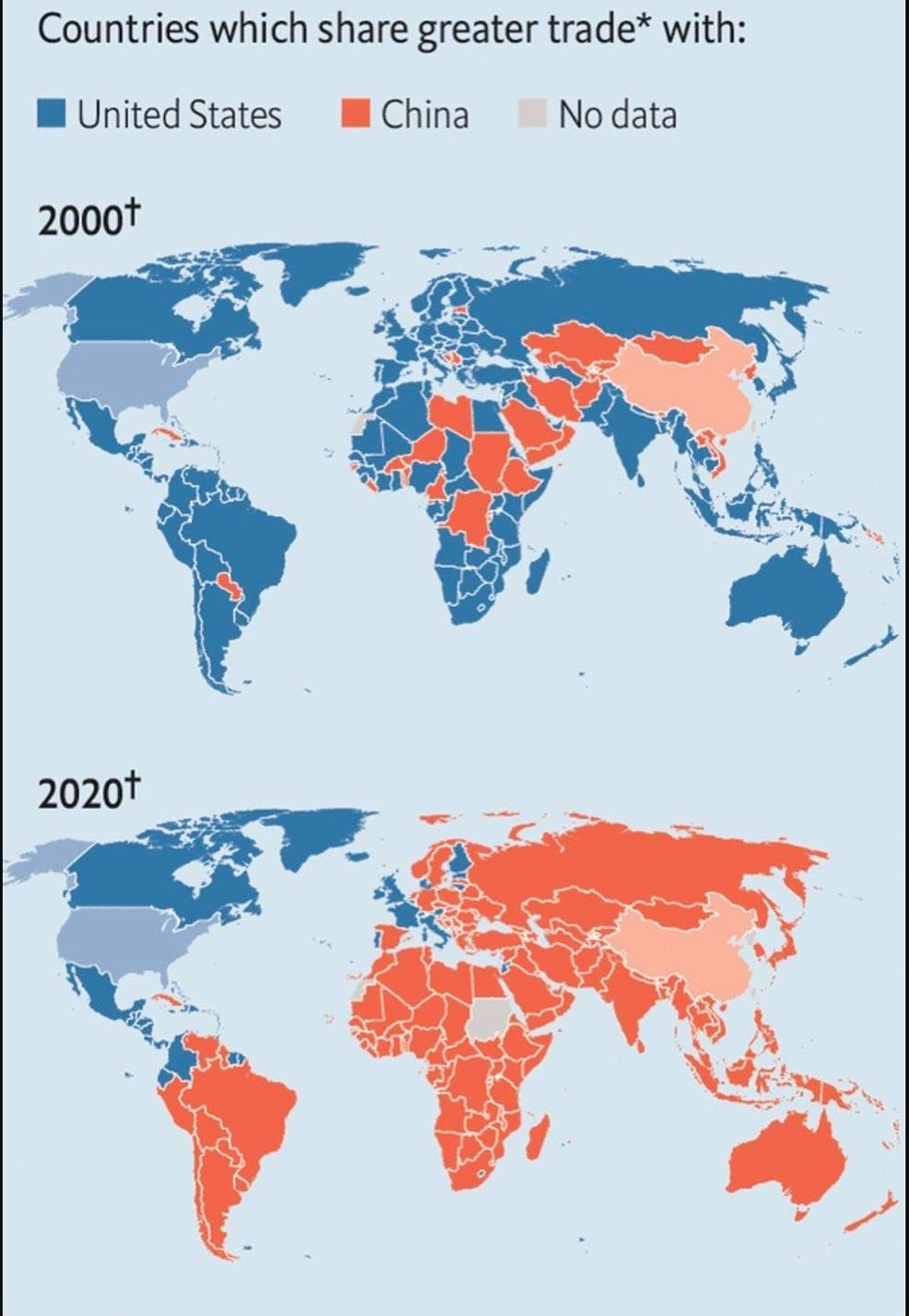Welcome readers to the 3rd edition of The Art of the New Cold War Newsletter.
This week we focus on topics including: sanctions, cyber warfare, COVID origins and Space Jam 2.
As always, for more information, please check out my book: The Art of The New Cold War
Feedback is always welcomed. Thank you for reading!
Topic 1: A Game of Sanctions
In response to the Hong Kong business advisory issued last week by the White House (and highlighted in The Art of the New Cold War Newsletter #2), warning American companies about the elevated risks of doing business in Hong Kong as the CCP tightens its grip over the semi-autonomous region, and which was accompanied by US sanctions against several CCP officials, China has now imposed its own sanctions on seven US individuals and entities.
Those sanctioned include former US secretary of commerce Wilbur Ross, US-China Economic and Security Review Commission Chairman Carolyn Bartholomew, former Congressional-Executive Commission on China staff director Jonathan Stivers, DoYun Kim from the National Democratic Institute, International Republican Institute associate director Adam King, Human Rights Watch China director Sophie Richardson and the Hong Kong Democracy Council.
China’s sanctions come only days before the long awaited talks in Tianjin between US Deputy Secretary of State Wendy Sherman, Chinese Foreign Minister Wang Yi and Vice Foreign Minister Xie Feng. Adding further acrimony to what was already poised to be a very acrimonious meeting.
This is also the first time that China has utilized its newly passed anti-sanctions law, which gives the CCP broad and wide ranging powers to punish individuals and companies that enable foreign penalties or sanctions to be implemented against Chinese companies and officials. Making clear that going forward US sanctions will be met with corresponding sanctions from China. Many US businesses operating in China will find themselves directly in the crosshairs, and should consider themselves forewarned.
The tit for tat sanctions between the US and China is unlikely to let up anytime soon, and if anything is likely to escalate further. Neither side wants to be seen (or in the CCP’s case can afford to be by their increasingly nationalistic citizenry) as backing down to the other. So every sanction will beget more and stronger sanctions from the other.
The Game of Sanctions is just beginning.
Topic 2: The World War Web
For years, China has waged extensive cyber warfare and cyber espionage campaigns against the United States and other nations throughout the world with near impunity. And as China’s cyber capabilities have grown, so have its attacks in the cyber realm. Increasingly a battlefield with real world and national security implications in an ever connected and digitized world.
This week the United States and its NATO allies took the unprecedented step of collectively calling out China for malicious cyberattacks, including a massive March attack that exploited Microsoft's Exchange Server.
This is the first time that NATO, a military alliance originally created to combat the Soviet Union in the first Cold War, has formally condemned China's cyber attacks. The U.S. Department of Justice also followed the condemnation by charging four Chinese nationals with targeting companies, universities and government agencies in the US and abroad.
While the formal condemnation, and subsequent US indictments, are certainly a step in the right direction in combating China’s widespread and malignant cyber activities, they are unlikely to alter or deter China without far more significant actions.
The U.S., and the world, must come to see China’s cyber attacks for what they are—acts of warfare, and engage accordingly. Up to and including retaliatory cyber attacks against China and its companies. It is long past time the US and its NATO allies go on the offensive against China in the cyber realm and escalate the costs for its attacks. Especially as The World Wide Web is fast becoming The World War Web.
Topic 3: COVID: An Origin Story
China is blocking the World Health Organization (WHO) from any further investigation into its Wuhan virology laboratories.
WHO recently announced that further investigation of the labs is warranted and required, as they may contain evidence related to COVID’s origins. But China has vehemently denied that this is the case, and continues to call the “lab leak theory”—that COVID leaked or escaped from Wuhan labs conducting research into, among other things, bat coronaviruses, and located in close proximity to where the world’s first COVID outbreak occurred—a debunked conspiracy theory.
However, while the lab leak theory was dismissed initially (and prematurely) by scientists in favor of natural origins, the theory has made a resurgence. Based upon the continued lack of evidence for COVID’s natural origins along with additional evidence for the lab leak theory, both circumstantial and otherwise, and prominent scientists calling for it to be fully investigated as a result. Senior Biden officials now even believe that the COVID lab leak theory is as credible as natural origins explanation. And President Biden has directed US security services to conduct a 90 day review and investigation into the probability of the lab leak theory.
Indeed, when one begins to look closely at it the Lab Leak Theory it actually makes the most sense. To that end, Josh Rogin, Washington Post columnist and author of the outstanding book Chaos Under Heaven, has done amazing work in this area by meticulously documenting the dangerous “gain of function” experiments conducted at the Wuhan labs and their severe lack of safety protocols.
China is obviously extremely unhappy about the continued resurgence of the lab leak theory, and that the WHO—of which they are a member and major funder—has not only not closed the door on it, but appears to be opening it up even wider, with formal calls for it to be a significant part of their Phase 2 COVID investigation.
Undoubtedly, the risks to China (and especially the CCP) are enormous. If the lab leak theory is confirmed it would not only completely contradict China’s narrative that it handled COVID successfully, but would open it up to worldwide condemnation for allowing COVID to spread, and for likely covering it up, if not worse.
For these reasons, China will continue to refuse to cooperate on any further investigation into the labs, and will continue to hide or bury relevant data, and suppress would be whistleblowers. But by doing so, however, China only serves to stoke the fires of suspicion and keep the lab leak theory alive.
For as Shakespeare once famously said: “Me thinks you dost protest too much.”
Topic 4: Lebron’s Space Jam 2 rejected by China
As of this writing, LeBron James Space Jam 2 movie is still not scheduled for release in China. This is despite the fact that the movie was made, and sanitized, specifically to satisfy the CCP censors. And despite the fact that Lebron James himself has consistently kowtowed and bent the knee to Beijing. Including even infamously rebuking Houston Rockets General Manager Daryl Morey for supporting Hong Kong’s freedom protests.
Not being released in China will be a massive financial hit for Space Jam 2. As reported by Fox, “without China, Space Jam 2 is likely to lose several hundred million dollars. Space Jam cost $200 million to make and market and is expected to earn only $60-70 million without a release in China.”
Hollywood generally has found China and the CCP much less receptive to their movies as of late. As Hollywood begins to face the same fate as every US industry in China. Whereby, the CCP only allows US companies to make money in China for a short time, so domestic Chinese companies can learn (and steal) from them. Then the CCP squeezes out US industry and ensures that the domestic industry takes over.
Expect LeBron and Hollywood to continue being rejected in China, despite their incessant kowtowing.
One Chart to Go:
The Economist magazine recently published the following chart. A stark perspective of how the balance of economic power has shifted from America to China ever since America (stupidly) allowed China into the World Trade Organization.






Intriguing!